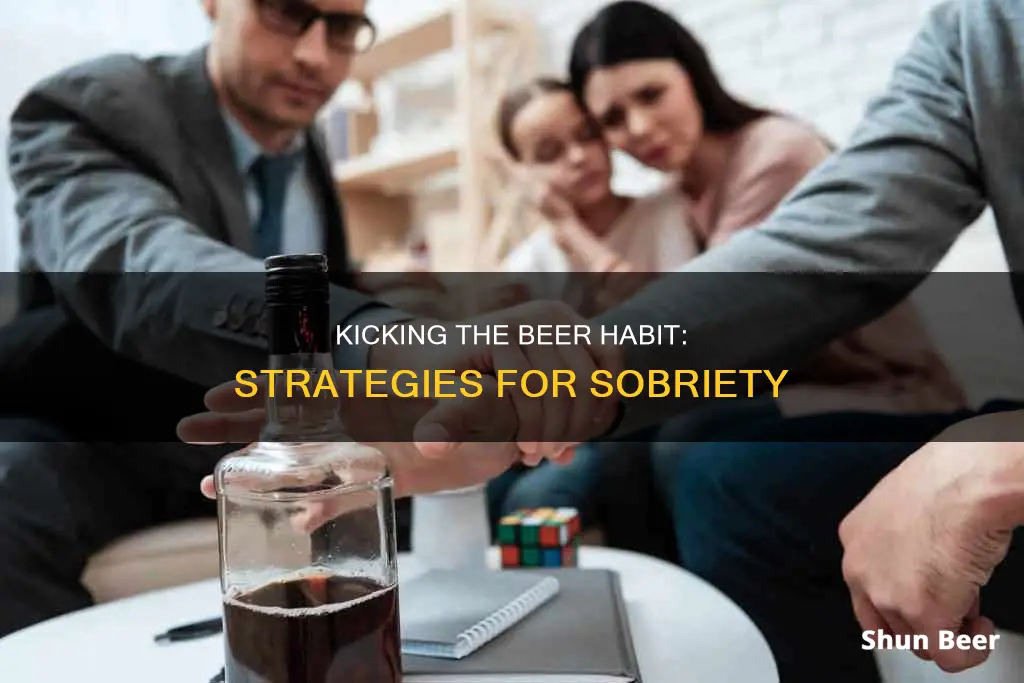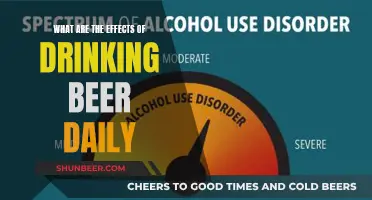
Quitting drinking is a challenging but rewarding endeavour. Whether you're looking to cut back or quit entirely, it's important to understand your relationship with alcohol and develop a plan that works for you. Here are some steps to help you quit drinking beer:
1. Understand your drinking: Reflect on why you drink, how much you drink, and identify any triggers that lead you to drink.
2. Set clear goals: Define your goals and what you hope to achieve by quitting beer. Improved physical health, mental clarity, and stronger relationships are some potential benefits.
3. Build a support system: Surround yourself with family and friends who can provide encouragement and support. Consider joining a community or support group with individuals sharing similar goals and experiences.
4. Find alternatives: Explore non-alcoholic alternatives to your favourite beverages. Discover new drinks and activities that you enjoy to help you stay away from beer.
5. Develop healthy habits: Adopt healthy habits such as regular exercise, mindfulness or meditation, and a balanced diet. These activities will distract you from cravings and contribute to your overall well-being.
6. Structure your daily routine: Create a well-planned daily routine with positive and purposeful activities. This will help you stay committed to your goal and avoid challenges.
7. Celebrate milestones: Acknowledge and celebrate your progress along the way. Treat yourself for reaching milestones to reinforce your commitment and stay motivated.
8. Seek professional help if needed: If you struggle to quit on your own, don't hesitate to consult a healthcare professional, therapist, or support group. They can provide guidance and treatment options tailored to your specific needs.
| Characteristics | Values |
|---|---|
| Recognise the problem | Understand your relationship with drinking and the reasons why you want to quit |
| Set goals | Set clear and realistic goals, such as improved health, better relationships, or weight loss |
| Build a support system | Seek support from family, friends, or local support groups |
| Find alternatives | Discover tasty non-alcoholic alternatives to your favourite drinks |
| Develop healthy habits | Exercise, eat a balanced diet, and practice mindfulness or meditation |
| Understand triggers | Identify people, places, and events that trigger your drinking |
| Create a daily plan | Structure your daily routine with positive activities to avoid challenges and improve your well-being |
| Celebrate milestones | Acknowledge and celebrate your progress, no matter how small |
| Seek professional help | Consult a healthcare professional, therapist, or support group if needed |
What You'll Learn

Understand your relationship with alcohol
Understanding your relationship with alcohol is a crucial step in quitting drinking. Here are some detailed and focused instructions to help you gain that understanding:
Identify your drinking patterns
The first step is to be honest with yourself about how much you drink. Keep a drinking diary for a few weeks, recording each time you have a drink, the amount you consume, and the situations or feelings that accompany your drinking. This will help you gain insight into your drinking habits and patterns. Ask yourself: Are there specific triggers that lead to drinking? Do certain people, places, or emotions make you want to drink? Identifying these patterns will help you develop strategies to manage your drinking.
Recognise the impact of alcohol on your life
Examine how alcohol affects your health, relationships, and overall well-being. Consider the physical and mental health consequences of drinking. Alcohol can impact your sleep, energy levels, mood, and cognitive function. It can also contribute to increased anxiety, depression, and conflicts with loved ones. Recognising these effects will help you see the benefits of reducing your alcohol intake.
Understand your reasons for drinking
Explore the underlying reasons why you drink. Are you using alcohol to cope with stress, anxiety, or other difficult emotions? Is drinking a social activity for you, or do you drink when you're alone? Understanding your motivations for drinking will help you address the root causes and find alternative ways to manage those triggers.
Assess your level of dependence
Be honest with yourself about whether you have a drinking problem. Ask yourself: Does my body depend on alcohol to function? Is my drinking causing problems with my health, social life, family, or work? Recognising a drinking problem is an important step towards change. If you're unsure, consider discussing your drinking habits with a healthcare professional or a trusted friend or family member.
Learn about alcohol addiction
Educate yourself about alcohol addiction and withdrawal symptoms. Understanding the signs of alcohol withdrawal and the potential consequences of prolonged alcohol consumption can be eye-opening. Resources such as medical insights from government and health organisations can provide valuable information to help you understand the physical and mental effects of alcohol and guide you toward support services.
Set clear and realistic goals
Before embarking on your journey, define your goals. What do you hope to achieve by reducing or quitting alcohol? Improved health, better relationships, enhanced mental clarity, or increased productivity? Having clear and realistic objectives will give you a sense of direction and motivate you throughout the process.
Quitting drinking is a personal journey, and understanding your relationship with alcohol is a crucial first step. By following these instructions, you will gain valuable insights and clarity, empowering you to make informed decisions and take control of your drinking habits. Remember, it's okay to ask for help. Reach out to trusted friends and family, and consider seeking professional support or joining a community of individuals with similar goals.
Beer and Melatonin: Safe to Mix?
You may want to see also

Identify your triggers
Identifying your triggers is a crucial step in quitting drinking. A trigger is a situation, place, or event that is tied to drinking. Being aware of your triggers can help you plan ways to manage the urge to drink. Here are some tips to help you identify and deal with your triggers:
Firstly, consider the reasons that make you want to drink. These reasons may vary from being with friends, feeling lonely or anxious, to celebrating a happy occasion. Being aware of your triggers will enable you to make solid plans for dealing with those situations. For example, if you tend to drink when feeling anxious, you could try affirmations, deep breathing, or meditation instead. Alternatively, if drinking is a social activity for you, you could try inviting a trusted friend who supports your decision to quit drinking to join you in social situations.
Change Your Environment
Your environment can play a significant role in triggering your urge to drink. Removing alcohol from your house can help prevent temptation and make it less convenient to drink. If you don't have alcohol readily available, you may be deterred long enough to find a distraction or choose a non-alcoholic alternative. Additionally, keeping busy with activities that get you out of the house and moving can be an effective way to avoid triggers and break the pattern of drinking.
Understand the Impact of Alcohol
Knowledge is power when it comes to quitting drinking. Understanding the impact of alcohol on your body and mind will empower you to make healthier choices. Educate yourself about the health consequences of alcohol consumption, such as increased blood pressure, liver disease, and cognitive difficulties. The more you know about the detrimental effects of alcohol, the easier it will be to resist the urge to drink.
Build a Support System
Quitting drinking is a challenging journey, and having a support system is crucial. Share your decision to quit with trusted family and friends who can provide encouragement and help hold you accountable. Consider joining local support groups or connecting with others who share similar goals and experiences. Having a support network can provide the encouragement and understanding you need during difficult times.
Celebrate Milestones
Quitting drinking is a gradual process, and it's important to acknowledge and celebrate your progress along the way. Whether it's one day, one week, or one month without alcohol, take the time to recognize your achievements. Rewarding yourself for reaching milestones will reinforce your commitment and motivate you to continue on your path to recovery.
Unlimited Beer Ads: Legal and Ethical Considerations
You may want to see also

Set goals and plan
Setting goals and planning is a crucial step in quitting drinking. Here are some detailed instructions to help you get started:
Understand Your Relationship with Alcohol:
First, take an honest look at your drinking habits and patterns. How much and how often do you drink? What are your reasons for drinking? Are there specific triggers that lead you to drink? By understanding your relationship with alcohol, you can develop a more effective plan to quit.
Define Your Goals:
Clearly define your goals and what you hope to achieve by giving up alcohol. Do you want to improve your physical health, enhance mental clarity, strengthen relationships, or boost productivity? Having clear and specific objectives will guide your journey and help you stay motivated.
Set Realistic Targets:
While setting ambitious goals is important, ensure they are also realistic and achievable. For example, you might start by setting a daily drink limit that is slightly lower than your current consumption. Gradually reduce this limit over time until you reach your desired level or abstinence. It's important to discuss your goals with a healthcare professional to ensure they are safe and tailored to your needs.
Create a Plan:
Develop a detailed plan with specific steps to achieve your goals. Decide on a start date and inform trusted family and friends about your decision. Prepare how you will respond when offered a drink, and what you will do if you encounter triggers or face challenges. Having a clear plan will help you stay focused and committed.
Structure Your Daily Routine:
Design a daily routine that supports your goal of quitting drinking. Fill your days with positive and purposeful activities that improve your overall well-being. This might include morning and evening rituals, healthy eating habits, regular exercise, mindfulness practices, or new hobbies. A structured routine can help you avoid challenges and reduce cravings.
Celebrate Milestones:
Recognize and celebrate your progress along the way. Whether it's one day, one week, or one month without alcohol, take the time to acknowledge your achievements. Rewarding yourself for reaching milestones will reinforce your commitment and motivate you to continue on your path to recovery.
Remember, setting goals and planning is a personal process, and it may vary depending on your unique circumstances. It's always a good idea to consult with a healthcare professional or seek support from friends, family, or recovery programs throughout your journey.
Breastfeeding After Drinking: How Long Should You Wait?
You may want to see also

Build a support system
Building a support system is a crucial step in quitting drinking. Here are some strategies to help you build a strong support network:
- Reach out to family and friends: Let your loved ones know about your decision to quit drinking. They can provide encouragement, support, and accountability. Explain your reasons for quitting and ask for their help in achieving your goal.
- Find a trusted support person: When attending social events or gatherings where alcohol is present, bring along a trusted friend or family member who supports your decision to quit. It's easier to turn down a drink when you have someone by your side.
- Connect with sober communities: Seek out and join communities, groups, or clubs specifically for sober people. These can be online or in-person. Connecting with others who are also quitting drinking can provide a sense of camaraderie and shared understanding.
- Explore mutual-support groups: Consider joining mutual-support groups such as Alcoholics Anonymous (AA) or SMART Recovery. These groups provide peer support and guidance from others who have gone through similar experiences.
- Seek professional help: Don't hesitate to reach out to healthcare professionals, therapists, or counsellors. They can provide valuable guidance, support, and strategies to help you quit drinking and maintain your sobriety.
- Utilise national helplines: Take advantage of national helplines, such as Drinkline, which offer confidential support and guidance over the phone. These services are usually free of charge and can provide valuable information and resources.
Remember, building a support system is an essential part of your journey to quit drinking. Don't be afraid to ask for help and lean on others during this process.
A Beginner's Guide to Enjoying a Beer Flight
You may want to see also

Find alternatives to drinking
Finding alternatives to drinking is a crucial step in quitting beer. Here are some strategies to help you discover and enjoy substitutes:
Explore Non-Alcoholic Alternatives
The market for non-alcoholic beverages is booming, with a growing demand for alcohol-free beers, mocktails, and other drinks. Experiment with different options to find ones that you like. You can also try non-alcoholic wines, beers, or ciders. These alternatives will make social situations more manageable and help reduce your desire for a drink.
Develop Healthy Habits
Replace drinking with positive, healthy habits that contribute to your overall well-being. Incorporate regular exercise into your routine, practice mindfulness or meditation, and adopt a balanced diet. Engaging in these activities will not only distract you from cravings but also improve your physical and mental health.
Keep Yourself Busy
Identify the times of day when you typically crave a drink and fill that time with alternative activities. Take up new hobbies, join a gym, learn a new skill, or find social groups that align with your new lifestyle. Activities that get you out of the house and moving are especially beneficial. For example, you could try hiking, cycling, dancing, or roller-skating.
Practice Self-Care
Quitting drinking can be stressful, so it's essential to prioritise self-care. Eat regular, balanced meals with energy-boosting and mood-enhancing foods. Aim for 7-9 hours of quality sleep each night. Additionally, consider journaling to track your feelings and thoughts during this journey. Self-compassion is key—be kind to yourself and remember that change takes time and effort.
Identify Your Triggers
Understanding your triggers is essential for managing cravings effectively. Recognise the people, places, and events associated with drinking, and if possible, avoid them. If avoidance is not feasible, admit your desire for a drink without judging yourself. Have a trusted support person you can call or text during challenging times, and keep your goals visible to remind yourself why you're making this change.
Beer and Weight Loss: Is It Possible to Have Both?
You may want to see also
Frequently asked questions
There are several steps you can take to quit drinking beer. Firstly, it is important to understand your relationship with alcohol and identify your reasons for quitting. You should also set clear and realistic goals and build a support system of trusted friends and family who can help you stay accountable. Additionally, you can try to find alternative drinks and develop healthy habits to replace your drinking habits.
Here are some tips to help you cut down on drinking:
- Don't keep alcohol at home
- Drink slowly and sip your drink
- Choose alcohol-free days
- Practice saying no politely
- Keep busy with alternative activities and hobbies
- Ask for support from friends and family
Quitting drinking can have several benefits for your physical and mental health. You may experience improved sleep, increased energy, weight loss, and better cognitive function. Quitting drinking can also lower your risk of developing alcohol-related cancers, liver disease, heart disease, and stroke. Additionally, you may notice improvements in your relationships and overall well-being.







